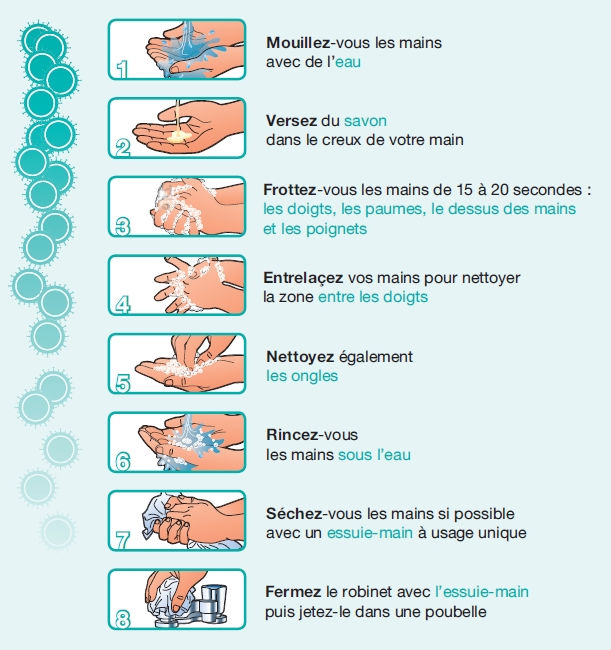According to figures from Public Health France *, the epidemic of influenza 2016-2017, which lasted for 10 weeks, caused the death of 14,358 people.
91% of them involve people aged 75 and over, or 13,136 deaths.
At the peak of activity (third week of January 2017), the ILI consultation rate was estimated by the Sentinelles network at 410 per 100,000 inhabitants. In total, 1.9 million people consulted for influenza-like illness.
The influenza virus is contagious, it is important to learn the right actions to limit the contamination at first, then treat it better if it comes (unfortunately) to infect us.
What is seasonal flu?
Influenza is an infectious viral disease. It is due to the influenzae virus.
The two influenza types responsible for seasonal epidemics are influenza A, which are divided into two subtypes: A (H3N2) and A (H1N1) pdm09; and influenza type B, which is divided into lineages: B / Victoria and B / Yamagata.
How is the flu virus transmitted?
The flu is transmitted through the respiratory tract and the touch.
When an infected person sneezes, spits or coughs, it releases respiratory secretions in the form of microdroplets that settle on the surrounding people and can contaminate them. Similarly, if you touch an infected surface and put your hands on the mucous membranes of the eyes, nose and mouth, you take the risk of catching the disease.
Once contaminated, it is necessary to count between 1 and 3 days of incubation before seeing the first symptoms appear.
 monkeybusinessimages / iStock
monkeybusinessimages / iStock
Influenza: the symptoms
Clinical signs vary with age and may worsen depending on the basic health status of the person with the disease.
The three main signs of the flu are:
- High fever (40 °)
- Respiratory signals (coughing, sneezing, runny nose, difficulty breathing)
- Myalgia (muscle aches, muscle aches).
Headache, intense fatigue, loss of appetite, malaise, conjunctivitis and digestive disorders may also be associated influenza symptoms.
As a result, we stay bedridden for a good week. Handkerchiefs and water bottle (to hydrate enough) at hand, we do not leave his duvet until we are fully recovered (e).
A virulent virus that can lead to complications ...
People with chronic diseases, cardiovascular or respiratory are more fragile and more likely to develop complications such as bacterial superinfections.
The other complication, and not the least, is death, but it is still very rare and once again, affects people whose health is already weakened.
When to consult?
You go to your GP as soon as the first symptoms appear. If the state of health seems alarming, one can go directly to emergencies or prevent the emergency services.
The doctor will then issue a work stoppage to recover (and especially avoid contaminating your colleagues).
How is the flu treated?
The only recommended treatment is taking an analgesic medicine, such as paracetamol, to reduce fever and relieve pain. You can also take a treatment for colds and coughs as a supplement.
The doctor may prescribe an antiviral medicine such as Tamiflu® for prevention or treatment. Only disadvantage, it must be taken in the first 48 hours after the onset of the appearance of the first symptoms to be really effective.
Influenza virus: the reflexes to limit the contamination
Whether you are already sick or want to protect yourself from possible contamination, the actions to be adopted will be the same:
- Wash your hands several times a day or use a hydroalcoholic gel and avoid as much contact as possible (shake hands, kiss a person ...).
- Blow your nose in a tissue and protect your mouth from coughs with your sleeve, hands or a tissue.
- Wear a mask for prevention (especially in confined spaces such as public transport) or if you are already sick to avoid contaminating those around you.
- Ventilate the interior of your home every day for about 10 minutes to renew the air.
 © santepubliquefrance.fr
© santepubliquefrance.fr
And the flu vaccine in all this?
The influenza vaccine is especially recommended for people with risk factors (chronic, heart, respiratory, morbidly obese, pregnant women ...) and medical personnel, very exposed.
Every year, people at risk receive a voucher, issued by social security, to be vaccinated. The influenza vaccine can be given by a nurse or attending physician. The important thing is to be vaccinated early enough (not when the epidemic has already begun), because it takes 15 days for the body to protect itself by producing antibodies.
Namely: Influenza vaccination is not 100% reliable and may be less effective on people whose immune systems are weakened by age or pathology. The flu vaccine changes each year of formulation. Another reason for its inefficiency may therefore be the inadequacy between the viruses present in the vaccine strain and the circulating virus.
Flu syndrome: what is the difference with influenza?
Influenza-like illness (or flu-like illness) is caused by respiratory viruses that usually circulate in winter. The latter triggers the same signs as the flu, but in much less intense proportions.
If in doubt, a breath sample may be taken.
* invs.santepubliquefrance.fr/content/download/134867/.../Bulletin_grippe_S09.pdf
Thanks to Sylvie Behillil, medical biologist - Molecular Genetics of RNA Viruses - National Influenza Virus Reference Center (North Region) - Institut Pasteur.



